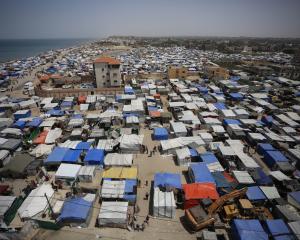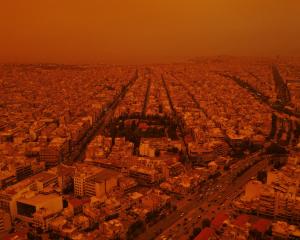
The centre-left leader won easy re-election a year ago but her approval ratings have slid since. Her government has virtually banned dollar purchases and it limited imports this year, worsening a steep economic slowdown.
High crime, inflation of roughly 25 percent a year, and a possible bid by government allies to reform the constitution to allow Fernandez to run for a third term are also stoking unrest, particularly among middle-class Argentines.
"We've taken to the streets because we're sick of crime and having our pockets picked. Inflation is killing us, our pensions can't keep up," said Daniel Gonzalez, 70, a retired teacher.
The pot-banging protests conjured memories of the demonstrations staged by angry savers, housewives and students during Argentina's 2001-02 economic and political crisis.
Protesters in neighbourhoods throughout Buenos Aires waved signs demanding freedom, transparency and an end to crime and corruption.
A spokesman for the city's Justice and Security Ministry estimated 700,000 people were rallying in the capital.
A similar, smaller protest was staged just two months ago.
Local television showed rallies in other cities, including Rosario, Cordoba and Salta. The demonstrations were organised through social media and not by any one political party.
Some Argentines even took to the streets abroad with hundreds of demonstrators gathering outside the country's consulates in Italy, Spain and the United States.
"We're protesting against Cristina's government so she listens to us. She's not infallible like she wants to seem. With this arrogance we won't get anywhere, we're already quite isolated (in the world) because of her policies," said Pedro Dominguez, a 56-year-old doctor protesting in Buenos Aires.
Fernandez's government has angered trading partners with import curbs and it riled Madrid when it seized control of energy company YPF from Spain's Repsol earlier this year. The country still has outstanding debts dating back to a financial meltdown a decade ago.
Critics say a government drive to break up the media empire run by Grupo Clarin is an assault on free speech. But supporters of the anti-monopoly law that is being enforced say officials are democratizing the airwaves.
DEARTH OF OPTIONS
Fernandez won 54 percent of votes in October 2011, largely due to an economic boom, job growth and expanded social programmes. Her government spends heavily to stoke high economic growth and backs big wage hikes that tend to mirror inflation.
Several government officials have been dismissive of the protests and accused organizers of being on the far right.
Fernandez told supporters on Wednesday (local time) that Argentines enjoyed more freedom of speech than ever before.
"If there's a sector that is demanding certain things, they have to stand up and say this clearly. Now, please, don't anyone think that I'll start contradicting my own policies," she said.
The president's approval rating edged up to 31.6 percent in October, up 1 percentage point from a month earlier, while her rejection rating dipped slightly to 59.3 percent, according to the latest poll by the Management & Fit consultancy.
Other polls have given her higher approval ratings but they also show a decline of 10 to 15 percentage points this year.
"The government and Cristina will emerge even weaker than they were (after the protests) but the opposition will show its impotence and its inability to channel these demands," said Sergio Berensztein, director of the Poliarquia political consulting firm.
Under the constitution, Fernandez cannot run for a third consecutive term in 2015. Local media report her congressional allies may try to reform the country's charter to change this, but the government has not confirmed any such plan.
For now, no opposition leader poses a real challenge to her and the ruling Peronist party still has strong support in the heavily populated working-class outskirts of Buenos Aires.
"Cristina won with 54 percent of votes and if there were an election today, she would win again because there are no opposition candidates," said Cesar Pacheco, a 62-year-old shipbuilder protesting outside the presidential palace.












